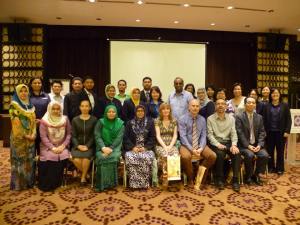Workshop Two: Supported employment in the UK – trends, innovations and challenges
Another early start for the team for a supported employment workshop at the Department of Social Welfare, Ministry of Women, Family and Community Development, Putrajaya (http://www.kpwkm.gov.my/home). Thirty job coach trainers, Officers from the Department of Social Welfare, Japan International Co-operation Association (http://www.jica.go.jp/english/), Labour Deparment, Social Security Organisation, Ministry of Health, Non-Government Organisations and Private Sector.
Swee Lan Yeo, a job coach and part of the Job Coach network in Malaysia , introduced the research team: Dan Goodley, The University of Sheffield, Katherine Runswick-Cole, Manchester Metropolitan University and Keith Bates, the Foundation for People with Learning Disabilities to the audience. Members of the audience had travelled from across Malaysia to attend the workshop getting up at four and five o’clock in the morning to attend.
Keith Bates started the session by describing the current context for employment for people with learning disabilities in the UK. Keith described that the employment rates for people with learning disabilities have changed very little over the last ten years and only between 7%-15% of people with learning disabilities are in work. Keith introduced some of the approaches to employment in the UK. (see powerpoint 1 below)
Following Keith, Dan Goodley and Katherine Runswick-Cole shared stories about people with learning disabilities and employment from the current research (see powerpoint 2 below). This presentation made a case for qualitative research. A discussion with participants revealed similar paradigm wars in Malaysia as they are in the UK (in relation to quantitative/qualitative debates).
After a tea break, Keith spoke about building aspirations and opportunities for people with learning disabilities in employment sharing the “When I grow up” programme (http://www.learningdisabilities.org.uk/our-work/employment-education/when-i-grow-up/) (see powerpoint 3). Following the presentation, discussion groups were asked “How do we build an assumption of employability for people with learning disabilities?” and “What messages do we give children with learning disabilities about employment”?
This was followed by a focus on how to create and how to improve good quality job coaching (see powerpoint 3). This led into a discussion of what it means to be a job coach and what the major challenges facing job coaches are which focused on the issues of the ‘professionalisation’ of job coaching.
After lunch, Keith described the emergence of quality standards for job coaches in the UK, as well as an emerging online directory for job coaches (www.findajobcoach.co.uk )
The day was concluded with a discussion about self employment and small business ownership for people with a learning disabilities. Keith gave an overview of current work in the UK before going on to describe some examples of how some people with learning disabilities have been supported to become self-employed in the UK. You can find out more about self employment for people with learning disabilities here: http://www.learningdisabilities.org.uk/our-work/employment-education/in-business/ . The story of Delroy exemplified a discivil society approach which views disability as a possibility rather than a problem in re-thinking ideas of independence, community and work.
The day ended with a plenary session bringing together the discussions from the day.
Responses from delegates:
“Malaysia is in the process of strengthening job coaching services, and today’s sharing has given us a direction I hope the government will take on further”.
“Session has reassured me that all people with learning disabilities can work if we give them the good quality support. Regardless of how severe I will try to discover and tap into strengths”
“Delroy was given the opportunity to be a contributor as well as having a job.”
“I will start to give awareness about employment, starting from school.”
“ I will think more about small businesses for people with learning disabilities”.
“I will share with families and communities knowledge about businesses.”


